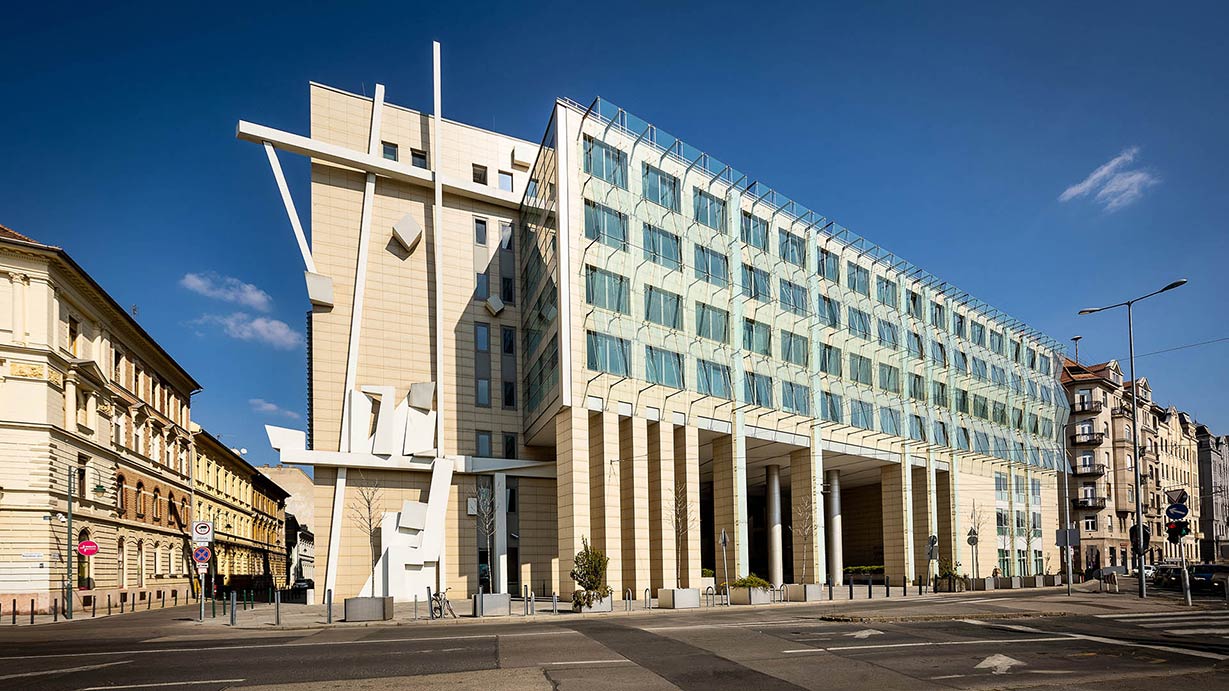A student forum was held at Corvinus on the ethics procedures

On 8 November 2023, in the main lecture hall of Building C, at the invitation of the Corvinus Student Union and the 23 student associations of the university, Acting Rector Lajos Szabó and Trade Union President Gábor Toronyai informed the students about the background of the recently concluded ethics and irregularities procedures.
At the initiative put forward in an open letter of the Student Union, the colleges for advanced studies and the student associations, on Thursday evening, 8 November, a student forum open to all university citizens was held at Corvinus where information was shared about the background of the ethics procedures, the irregularity inquiry and the circumstances of Zoltán Ádám’s dismissal. The event was organised to give participants a clearer picture of the situation and to allow members of the university citizenry – students and lecturers alike – to ask and get answers to their questions. The forum, which attracted more than 200 participants, mostly students, was moderated by Kristóf Kovács, President of the Corvinus Student Union, who thanked the two invited guests, Acting Rector Lajos Szabó and Trade Union President Gábor Toronyai, who both readily accepted the invitation and presented their views in 15 minutes each.
In his intervention, Gábor Toronyai asked students to stand up for university autonomy and stressed the need to stop the erosion of confidence and protect the value of their diplomas. He said that he missed the President of the University and the President of the maintainer’s Board of Trustees at the forum. The organiser Kristóf Kovács later said that they were not invited in the first place. In the opinion of Trade Union President Gábor Toronyai, it is the fault of the university’s management that Corvinus’ reputation has been damaged and there is embarrassment. He suggested that the responsible leaders should resign and Zoltán Ádám should be reinstated. He underlined that, in the spirit of standing up for university values, a university should not be run on the basis of improperly interpreted corporate principles, and that university autonomy and freedom of expression should be protected. He called for the introduction of a new ethics code with robust procedures and a hotline for reporting attempts to influence.
Lajos Szabó summarised what has been said of the case at the Senate meeting on 7 November. He said that at the university no parent or family member may put pressure on either lecturers or staff, any such attempt should be rejected. He also stressed that no student should be given any advantage or be subject to any discrimination. He explained in detail the ethics procedures, outlining the reasoning leading to both the first and second instance decisions, which examined whether there was full certainty that an ethical abuse had occurred. The final resolution was that no ethical abuse had been committed in the case by one of the colleagues concerned and that no such abuse could be proven in the case of the other colleague. He pointed out that there are lessons to be learned for the university, for instance, at Corvinus there are unfortunately several practices that deviate from the rules, which could also be used to create similar ethics cases. Since the remodelling of the university, the institution has made a number of improvements, and the relevant regulatory processes need to be harmonised. Lajos Szabó stressed: the case was escalated by Zoltán Ádám for his personal ambition, so it is difficult to ignore the political thread.
During the briefings, using an online interface, the students and lecturers could pick the questions they were curious about in each moderated block, and the most popular ones were answered by the speakers. More than 150 questions were received, including why the minutes of the sessions of the ethics committee are not published anonymously, whether the dismissal was proportionate as an employer’s action, why the ethics committee resigned and why Zoltán Ádám was not invited. A detailed report on what was said at the student forum will be published on the university’s website soon.
Update: Detailed report
Corvinus provided English interpretation at the event.
Corvinus has previously provided information on this topic in the following articles (with Hungarian versions):
- 2023. November 8. The first meeting of the Senate in November was held in two parts, in two locations, and was highly attended – website, intranet
- 2023. October 31. Lajos Szabó: No student should gain an advantage or suffer a disadvantage on account of their financial or family circumstances – website, intranet
- 2023. October 27. Dialogue on the ethics and irregularity procedures – website, intranet
- 2023. October 24. Employer action taken as a result of an irregularity inquiry – website, intranet
- 2023. October 24. Different subject syllabi, unfair requirements and discrimination – website, intranet
- 2023. September 7. Structural changes having been completed, this academic year is all about fine-tuning – website, intranet